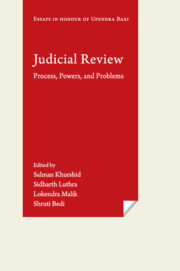Book contents
- Frontmatter
- Contents
- Foreword
- Editors' Note
- Introduction
- 1 The Inadequacy of Judicial Enforcement of Constitutional Rights Provisions to Rectify Economic Inequality, and the Inevitability of the Attempt
- 2 The Interplay of Law and Politics in India
- 3 Beating the Backlog: Reforms in Administration of Justice in India
- 4 Judicial Review: Perspectives and Reflections for the Twenty-First Century
- 5 When ‘Creeping Jurisdiction’ Goes Awry: The Social Action Litigation to Ban Surrogacy
- 6 Judicial Review and the Democratic Judge
- 7 Judicial Review: A Tool to Shape Constitutional Jurisprudence
- 8 The Baxian Bioscope on Indian Judicial Process
- 9 Judicial Activism, Courts, and Constitutional Revolutions: The Israeli Case
- 10 Democracy, Constitution, and Judicial Review: A Critique
- 11 A Minor Jurisprudence of Pathos: Upendra Baxi as Teacher and Writer
- 12 The Need for Reinventing the Supreme Court as a Constitutional Court
- 13 Appointment of ‘Distinguished Jurists’ as Judges in the Supreme Court of India: A Critical Analysis
- 14 Judicial Dissent and Judicial Review: A Functional Analysis
- 15 The Power of Judicial Review: Judicial Chutzpah or Judicial Desideratum
- 16 Judicial Review of Legislations by Tribunals in India: Law, Problems, and Perspectives
- 17 Criminalization of Membership of Terrorist Organizations in India and the United States of America: Human Rights Concerns
- 18 Article 142 of the Indian Constitution: On the Thin Line between Judicial Activism and Restraint
- 19 Sketching the Limits of Article 142 of the Constitution of India: A Constitutional Necessity
- 20 Constitutional Morality and Judges of the Supreme Court
- About the Contributors
- Index
Foreword
Published online by Cambridge University Press: 23 January 2020
- Frontmatter
- Contents
- Foreword
- Editors' Note
- Introduction
- 1 The Inadequacy of Judicial Enforcement of Constitutional Rights Provisions to Rectify Economic Inequality, and the Inevitability of the Attempt
- 2 The Interplay of Law and Politics in India
- 3 Beating the Backlog: Reforms in Administration of Justice in India
- 4 Judicial Review: Perspectives and Reflections for the Twenty-First Century
- 5 When ‘Creeping Jurisdiction’ Goes Awry: The Social Action Litigation to Ban Surrogacy
- 6 Judicial Review and the Democratic Judge
- 7 Judicial Review: A Tool to Shape Constitutional Jurisprudence
- 8 The Baxian Bioscope on Indian Judicial Process
- 9 Judicial Activism, Courts, and Constitutional Revolutions: The Israeli Case
- 10 Democracy, Constitution, and Judicial Review: A Critique
- 11 A Minor Jurisprudence of Pathos: Upendra Baxi as Teacher and Writer
- 12 The Need for Reinventing the Supreme Court as a Constitutional Court
- 13 Appointment of ‘Distinguished Jurists’ as Judges in the Supreme Court of India: A Critical Analysis
- 14 Judicial Dissent and Judicial Review: A Functional Analysis
- 15 The Power of Judicial Review: Judicial Chutzpah or Judicial Desideratum
- 16 Judicial Review of Legislations by Tribunals in India: Law, Problems, and Perspectives
- 17 Criminalization of Membership of Terrorist Organizations in India and the United States of America: Human Rights Concerns
- 18 Article 142 of the Indian Constitution: On the Thin Line between Judicial Activism and Restraint
- 19 Sketching the Limits of Article 142 of the Constitution of India: A Constitutional Necessity
- 20 Constitutional Morality and Judges of the Supreme Court
- About the Contributors
- Index
Summary
I am not only delighted by the request to contribute to this festschrift by writing its foreword, but the occasion is also an honour vested upon me, for Professor Upendra Baxi is one of those who have made a lasting contribution to the strength of jurisprudence globally.
Professor Baxi, an international celebrity and a sartorially elegant Professor of Law, had his stints at the University of Sydney, Duke University, American University Washington College of Law, New York University School of Law, and the University of Toronto.
With innumerable articles and books to his name, he has won many laurels and has been conferred many and varied awards, fellowships, distinctions, and honours. Being a judge of judges is a highly complex task. It is easy to be critical of the judgments of the courts, but critiquing the judgments in a scholarly manner is the prerogative of only a few. Professor Baxi falls in that coveted category, whose critical comments are taken with solemnity as he writes with a sense of responsibility. That is the reason that respectability is attached to whatever he says. For his contribution to legal and political affairs, Professor Baxi was awarded the prestigious civic honour—the Padmashri—by the president of India in 2011. More recently, Professor Baxi has been the recipient of an award for his contributions to constitutional law, conferred upon him by the Supreme Court of India. A more befitting honour would have been to elevate him as a Supreme Court judge in the 1980s.
Professor Upendra Baxi is a role model for the thousands of students whom he has taught. Many of them have scaled great heights in their careers—as teachers or lawyers or judges or in other callings chosen by them. He is adored and respected by all. I am blessed to belong to this category. He was our dean when I was a student of law. I feel privileged to have had close association with Professor Baxi in multiple ways. Not only as a student but I also had the privilege of being his colleague in the University of Delhi during my stint as a teacher. I have the continuing honour of sharing the dais with him on a regular basis. I keep learning from his wisdom.
- Type
- Chapter
- Information
- Judicial Review , pp. vii - xxiiPublisher: Cambridge University PressPrint publication year: 2020

